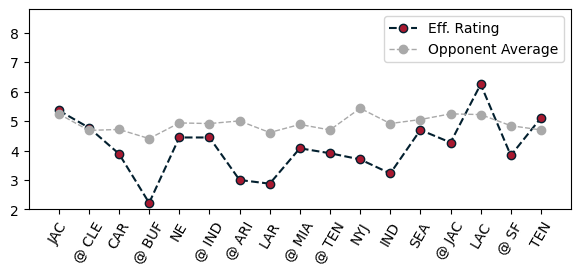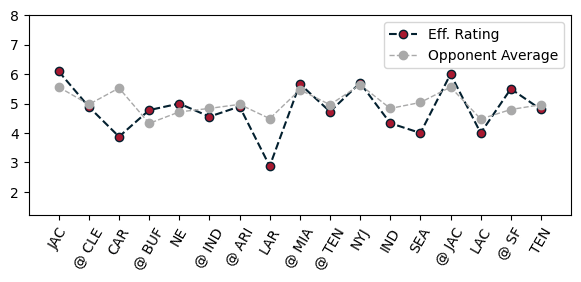Part 20 of my 32-part series breaking down every team’s performance in 2021. Check out part 19 on the Jacksonville Jaguars. Part 21 now available: Atlanta Falcons.
Offense
| Eff. Rating | Adj. Rating | Rank |
|---|---|---|
| 4.12 | -0.79 | 32nd |

| Pass EPA | Rush EPA | Adj. Pass Rate |
|---|---|---|
| 30th | 32nd | 27th |
It’s really incredible that the Texans won 4 games in 2021 considering the shape they were in heading into the season. They paid Deshaun Watson to be inactive every week after he tried to stiff-arm his way out of the organization and faced numerous lawsuits. They had all new leadership and had traded away most of their draft capital so they populated the roster with cast-offs from other teams. Even veteran Tyrod Taylor disappointed. They were so bad on offense that they were seemingly at their best with third-round rookie Davis Mills running the show.
But that’s a low bar. The Texans’ pass game was bad in every way. They did not utilize a viable deep threat, finishing with the 7th-lowest average depth of target in the NFL. Typically, teams that opt for a short passing game will offset this with yards after the catch. But the Texans had the 10th-lowest yards after the catch per completion. These short passes were also inaccurate, with the 7th-lowest on-target percentage. When they weren’t throwing short, inaccurate passes, they were taking sacks at the 6th-highest rate of sacks per pressure. Yikes.
They didn’t get much help at all from the run game. They finished dead last in yards per carry, yards before contact, rushing DVOA, adjusted line yards, and overall rushing EPA/play. It was pretty much a disaster from start to finish on offense, although they did shockingly piece together those four wins.
Houston was a run-heavy team that played its best football when they managed to run the ball successfully. It didn’t happen often, but when it did, it made a huge difference. Davis Mills was simply not good enough to carry the team. So when they hosted the Chargers, who fielded the 2nd-worst run defense in the NFL, Rex Burkhead ran for 149 yards and 2 touchdowns on 22 carries (yes, you read that correctly) and the Texans sprang their biggest upset of the year, which ended up being enough to keep the Chargers out of the playoffs. Chart A shows the direct correlation between the Texans’ offensive effectiveness and their opponents weakness versus the run, ranking each opponent by EPA/play allowed on the ground over the course of the season. They generally struggled even relative to their low expectation against good run defenses but performed better against poor run defenses.
Chart A

Despite this offense’s struggles, we saw some hot takes about Davis Mills late in the season, arguing he was the second-best rookie quarterback behind Mac Jones. These surface-level takes were wrong, in my opinion. Davis Mills’ stats were inflated by garbage time. For example, against the Rams he was 12/18 for 91 yards and an interception while the Rams took a 38-0 lead. From there he poured on 17/20 for 219 yards and 2 touchdowns without ever being within one score in a 38-22 loss. Against the Titans, he was 7/14 for 61 yards while the Titans took a 21-0 lead. Then he went 16/19 for 240 yards and 3 touchdowns in a futile comeback effort that never saw them with the ball and a chance to win.
Now, garbage time is somewhere between meaningful and meaningless. He still put up those numbers and showed the ability to capitalize against soft coverage, even with less than optimal weapons around him. That counts for something. But it’s tough to draw the conclusion that he can be a reliable starting quarterback in this league. It is a starting point, and it looks like the Texans will give him another year. Overall, I’m not optimistic.
I’m not sure where this team is in the rebuilding process. Usually a team that has won 4 games in back-to-back years has been building for the future, but unfortunately the Texans weren’t able. They showed effort and heart under Dave Culley, who I thought did a tremendous job last year. But he got fired anyway. This could be the worst offense in the league again, and there’s a long way to go in the rebuilding process.
Defense
| Eff. Rating | Adj. Rating | Rank |
|---|---|---|
| 4.81 | -0.20 | 26th |

| Pass EPA | Rush EPA | Blitz Rate | Pressure Rate |
|---|---|---|---|
| 25th | 23rd | 30th | 28th |
It’s really tough on a defense when the offense does not perform. The Texans defense actually played close to average overall, but it’s tough to draw too much from that. Their games were often not competitive enough to put the defense in bad spots, especially considering that they were slightly stronger against the run than the pass. Defensive performance ties closer to the strength of opposing offenses in general, and game script plays into that.
They did have some talent on the defensive side of the ball. But they lacked depth, and it was too easy for opposing offenses to find the Texans’ weaknesses. The flaws go back to the major errors in team-building from bad management over the years. Opposing offenses did not need to get particularly creative to make things happen against the Texans. It pretty much came down to how effective teams were at doing what they wanted to do.
The Texans did nothing particularly well defensively. They didn’t get to the quarterback and were not particularly strong in coverage over the entire field. Football Outsiders ranked them 8th in DVOA against opposing number one wide receivers. However, their defensive performance actually trended worse overall against teams with a high concentration of yards going to their top receiver. Chart B shows this trend:
Chart B

This split usually results from a defense that lacks depth or has weakness in other areas. If they sold out to stop one player, teams just used their secondary and tertiary options. But in this case, I think the DVOA numbers might just be wrong. Their three worst defensive performances involved getting carved by Cooper Kupp (7/115/1), D.J. Moore (8/126), and Tyler Lockett (5/142/1). And all three of these games were absolute blowouts, so those stats could have been even higher.
The Texans have a lot of holes on defense that will likely take a few years to fill. Lovie Smith has done well with defenses in his career and was ahead of the curve in implementing predominantly Cover 2 schemes that are taking over the NFL. A good scheme can overcome some gaps on defense in talent (not all of them), so I think one year of building might be all it takes. They are starting from an okay spot and, particularly if Derek Stingley can have an immediate impact, they won’t be a total walkover.
Key Takeaways
When to bet on the Texans: It takes a strong stomach to take a bad team, but Davis Mills in garbage time combined with inevitable big spreads can create value in certain spots. Look for situations where the opposing team cannot run the ball effectively and/or plays with a slower pace, especially if they don’t stop the run well.
When to fade the Texans: Avoid the Texans against teams that don’t take their foot off the gas and pressure the quarterback effectively. They could be in for some long days where even garbage time is not enough to cover a big spread.
What to look for in the offseason: With so many gaps on this roster, I think the Texans are not looking to bridge them all at once. They went after quality at the top of the draft where they found it (cornerback and offensive lineman) and look to be building a better situation for a potential quarterback replacement in 2023.
Enjoyed the content?
For all my analysis and NFL bets as I make them (including eleven NFL futures so far), become a SharpClarke Member for the 2022 season here:
